My Mastermind Group read the book, ‘The Compound Effect‘ by Darren Hardy early last year. In the book, Darren talks about the importance of measuring your time to ensure you’re spending time on the right things. One of the women in our group tracked her time for an entire month and reported back to the group what it had done. She said that it made her more aware of where she was wasting time in her day and thought it was a valuable exercise. I decided to try it.
First I tried paper and pen and wow, that did not work. I forgot the notebook or I couldn’t find a pen. That low-tech method was not consistent.
Then I started trying different time tracker apps for my iPhone. I’m rarely without my phone. The time tracker app I liked the best is ‘Eternity.’ They offer a free version to try. I quickly upgraded to the paid version when I realized the app could do everything I wanted. Once I set up my categories (this took about 30 minutes), I religiously started tracking my time.
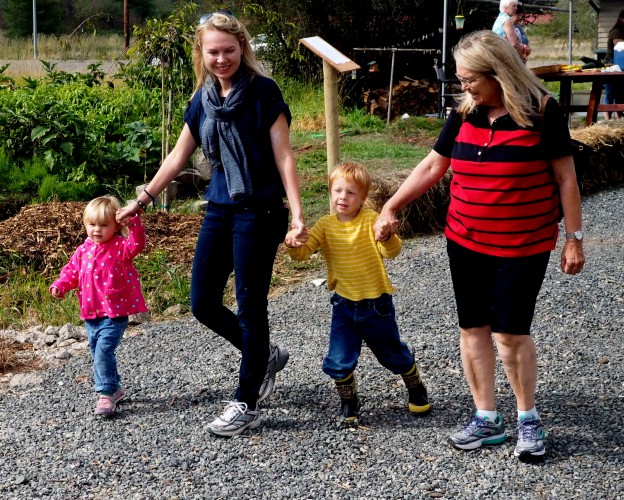 At first, tracking my time seemed to take away from being in the present, especially with family. After simplifying my categories, it got much easier!
At first, tracking my time seemed to take away from being in the present, especially with family. After simplifying my categories, it got much easier!
Immediately, I noticed one thing: irritation. I had to physically remove myself for whatever situation I was in to pick up my phone and switch my task on my phone. This seemed counter-intuitive to the idea of ‘being present‘ or ‘be here now.’ I worked through that pretty quickly by making a switch where it really mattered: I made sure that ‘family’ was just one main category without any sub categories to keep the phone out of my hand as much as possible with my kids. I did design categories for ‘play’ to ensure that I was measuring how much time I worked out, saw my friends and did date night with my sweet husband but kept them to a minimum so I could ‘be here now’ when I was having valuable relationship time.
This is my work life broken down into major categories for a year:
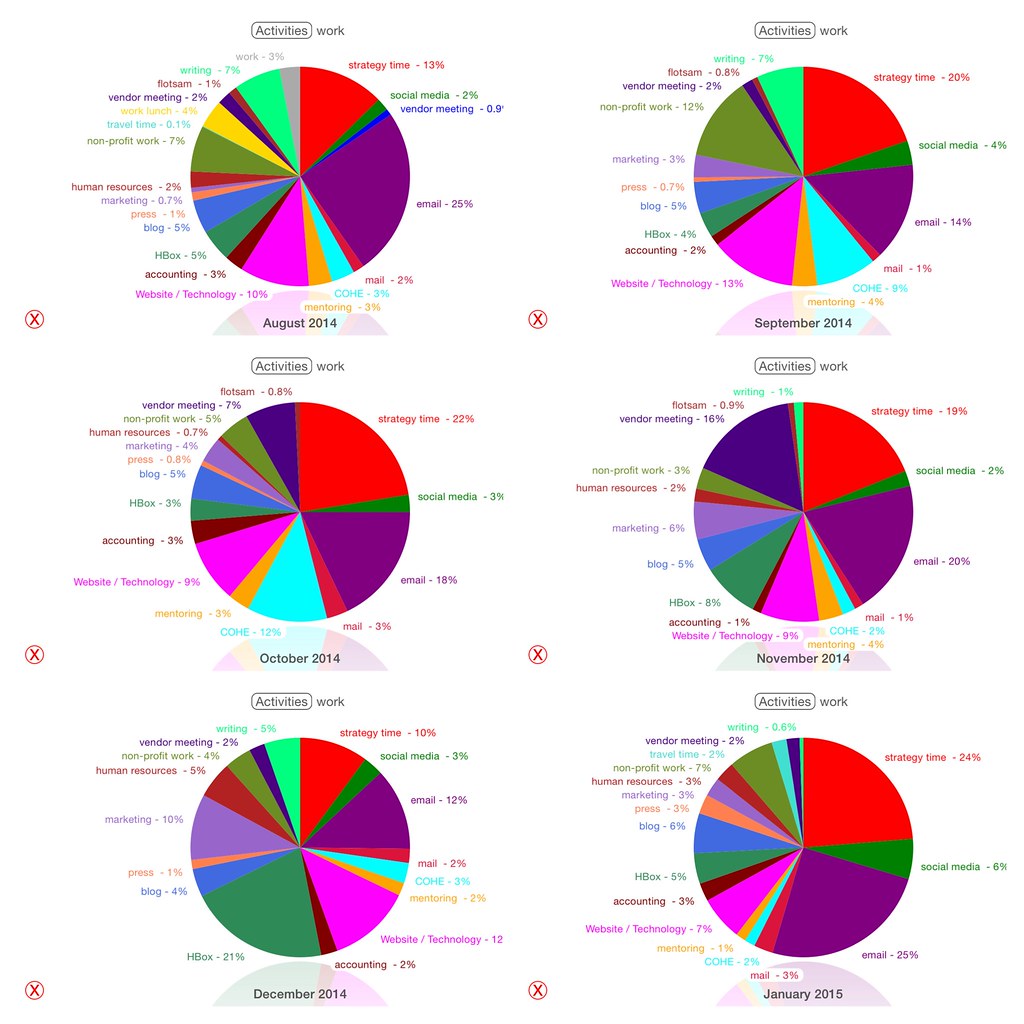
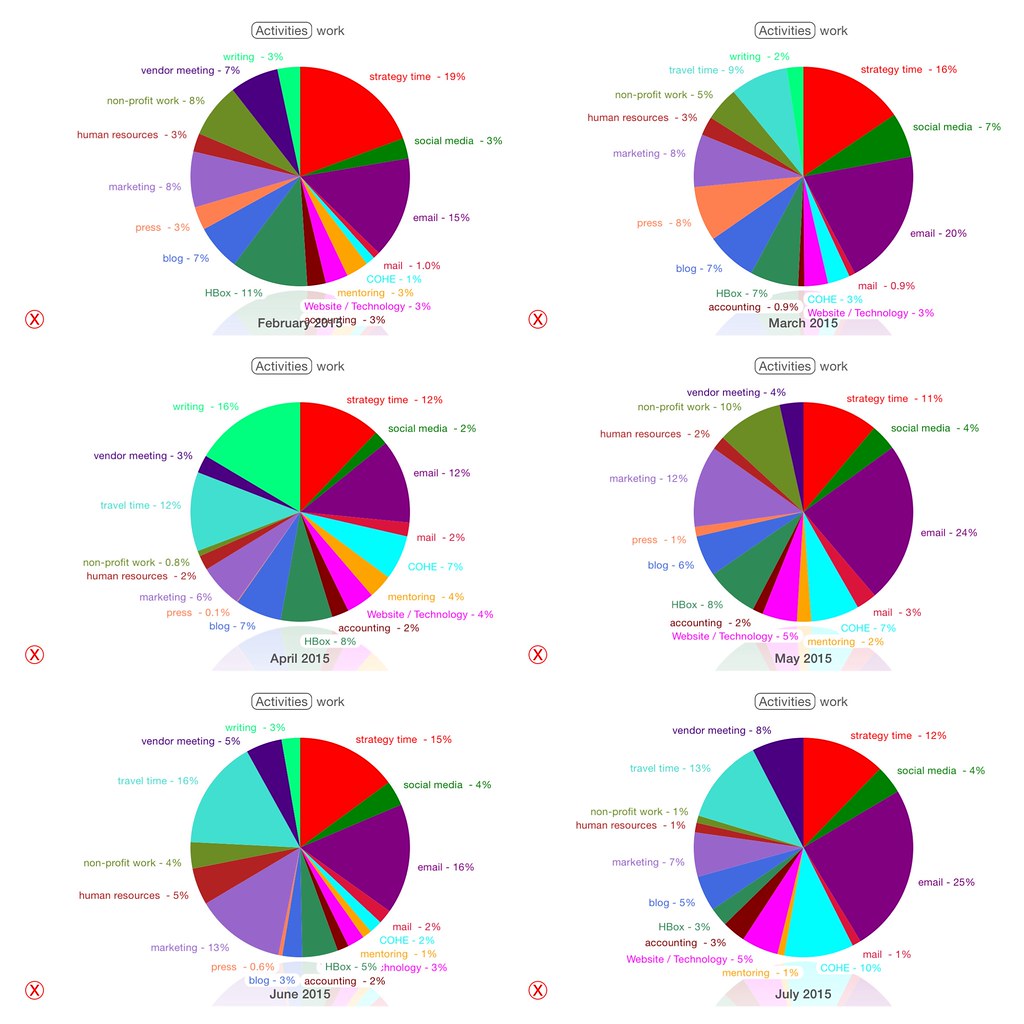
Things I learned:
1. Email is the black hole of time wasting. When I first started time tracking, I was horrified when I saw how much time I was spending on email. 25% of my work time on email? Talk about not productive; talk about the opposite of ‘management by walking around.’ Not good. Batch tasking solves this. Mostly. When you (I) do email, it’s jumping from one task to another. It’s working in fits and starts. Email becomes the task master. On the months that email time was down to 15% or below, I was religiously using the ClearTimer app and setting 30 minute focus time goals. If I didn’t use the timer, email use crept up. Spending time on email is connecting with my team or working on new products and projects so it is valuable and necessary time. However, I’d rather ‘do’ than ‘talk’ (or in the case of email, write) so keeping this below 15% helps me focus on the big goals for myself and the company.
2. Batch Tasking is the savior. Dave Crenshaw talks about how we’re actually all terrible multi-taskers and we waste time when we don’t focus on one thing at a time. It turns out that he’s right about that for me. Batching my tasks and following the ‘Feared Things First’ model (do the five most important, difficult things first thing in morning) worked/works wonders for me when I’m actually following it. It takes discipline to do this (example: all I want to do right now is stop, eat lunch and read People.com to give my brain a rest from writing this post).
3. You need to goals to measure against. The reason that tracking my time is useful is because I know where I am going for the month and for the week. I’m a devotee of the Stephen Covey ‘7 Habits of Highly Effective People‘ coupled with the Verne Harnish ‘Scaling Up/Rockeffer Habits‘ planning strategies. Because of this, I know what I should be spending my time on. I can ask myself: how does my daily activity fit with my mission? I know what I’ve told my team I’ll be spending my time on. And, I know what people are counting on me for. When it’s clear that I’m not achieving those goals or keeping promises I’ve made to other people (hello July and the Email Monster that Gobbled Up My Time), tracking my time helps me be aware and put my goals back into alignment.
4. Fixing a case of the ‘over promising, under delivering’. When I’ve planned my day out and I’m living by my calendar, over promising goes by the wayside. Tracking my time helped me and helps me set clear boundaries and goals. It is so much easier to say ‘no’ when I know what I’d be giving up to say ‘yes.’ When I’m tracking my time and focusing on one area, it is very obvious what I need to give up in order to focus on something that will really move my business dial. A real life example: Handmade Beauty Box needs more of my time as a brand new start-up but I’m not giving it as much time as I need to be. This will change since I’m able to track progress on that goal. What gets measured gets fixed.
5. What you can measure, you can delegate. Perhaps the most difficult thing for me to do is to let go and to delegate. By tracking my time, it’s clear that I need to delegate. My rule is simple: if it takes me five minutes and someone else can do it, I delegate. I am trying to grow the ‘strategy‘, ‘marketing‘, and ‘mentoring‘ pies of my graph. That is what will help get my company to the next level by improving my team and how we communicate. By measuring my time, I can tell if I’m doing a good job outsourcing and delegating or, if I’ve fallen into the trap of ‘It’s easier to do it myself.’ I averaged 55 hours of work per week for the 12 months of tracking but by leveraging delegation, I know that time was more valuable than just the 2860 hours that it added up to.
The results are graphed out below for the major five life categories of sleep, household, family, work and play (reminder: the house blew up in March 2015 so that skewed work/family time as we moved houses multiple times over the next two months, finally making the move to a permanent, final home in May. You can see that both work and sleep suffered those months):
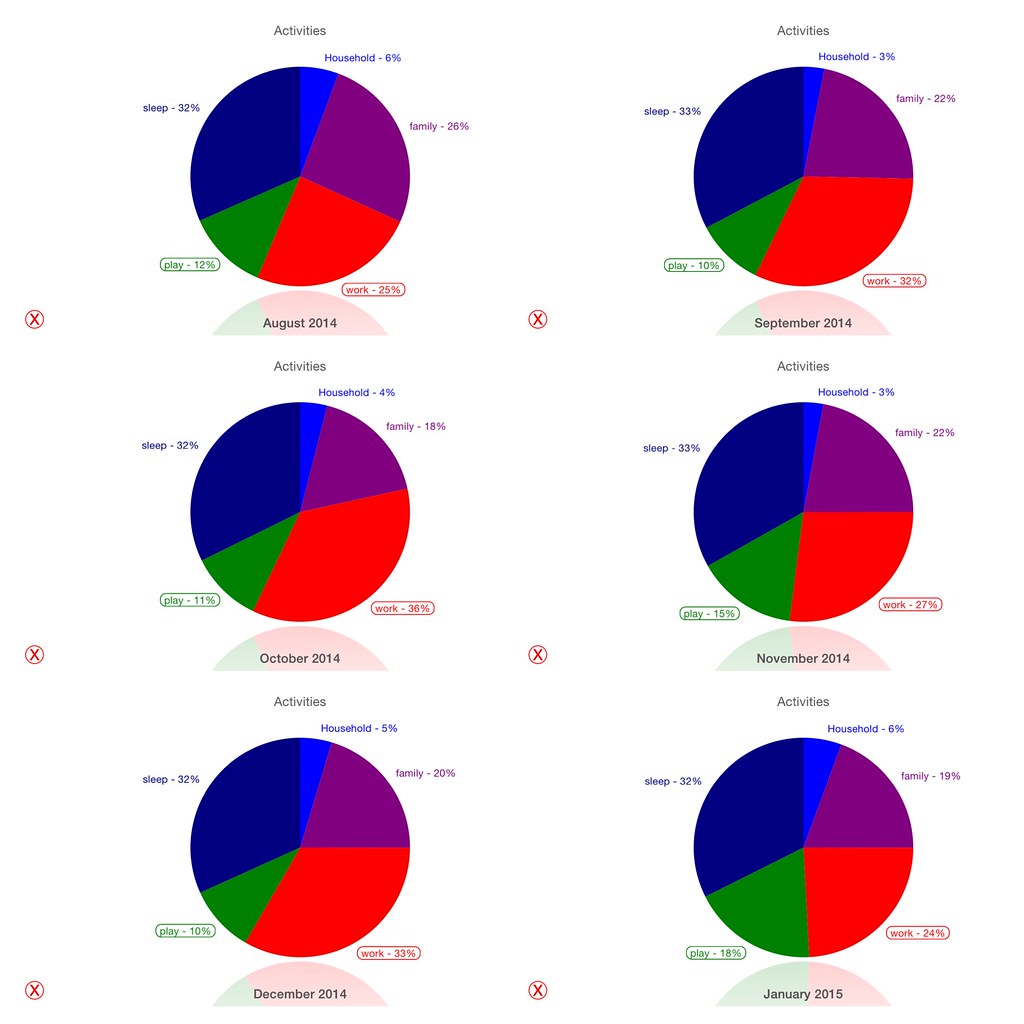
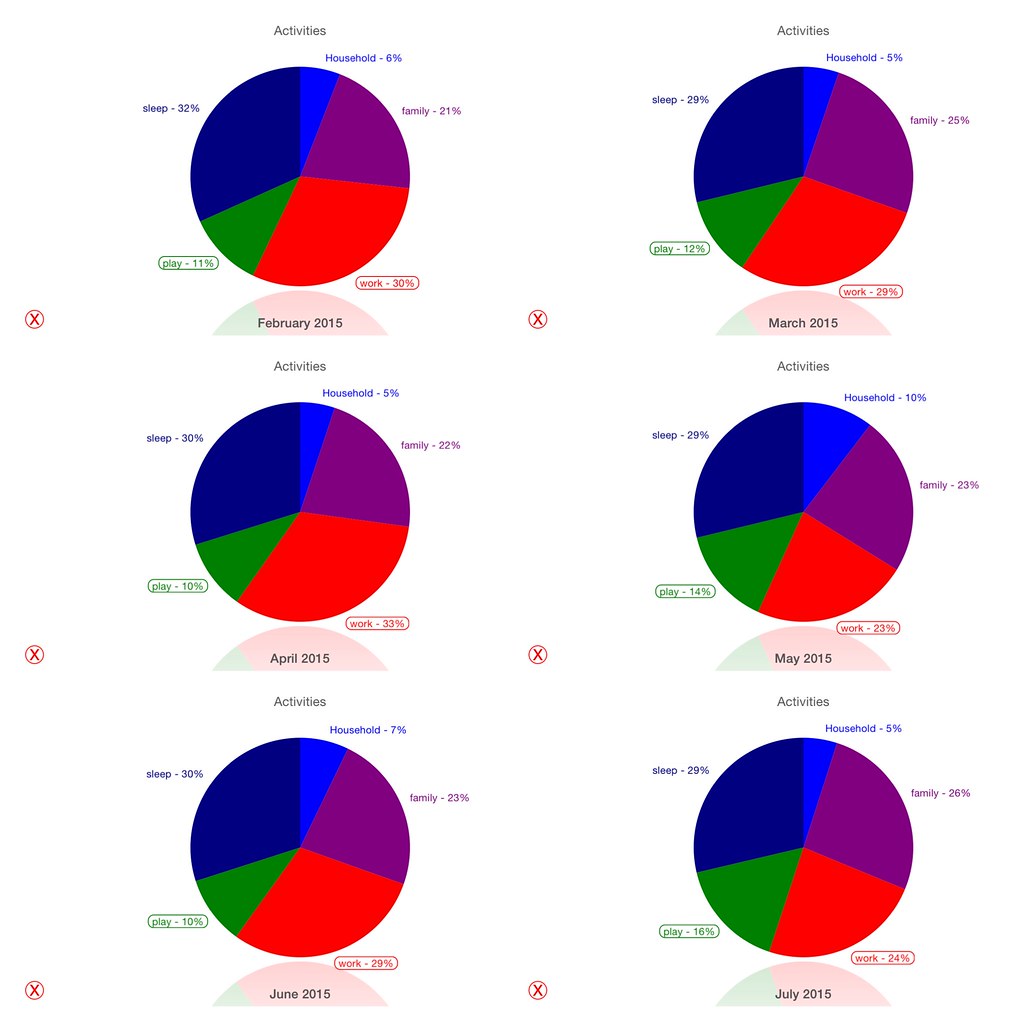
A note about categories ‘family’ and ‘household.’ I only turn the ‘household’ tracker on when I am without children cleaning the house or preparing meals after they’re asleep. If the kids are with us and are playing quietly* in the corner while I empty the dishwasher, this stays in the ‘family’ tracker. The ‘play’ category comprises everything from working out, to reading, to online browsing, to date night to friend time. (* ha! who am I kidding? They never play quietly in a corner. They are probably one step away from doom and destruction of each other or our furniture as I empty the dishwasher.)
Lessons learned from tracking just these four big categories:
1. Leisure time is really the only category that can move much. It’s hard to move the needle in the big categories. Ultimately, I need a certain amount of rest each night (7 hours is ideal for me). One of our values as a family is ‘quality time’ so that means a certain amount of time is spent as a family. The household takes a time to run (assuming we all like clean dishes and washed undergarments). If we’re not moving (May 2015), household tasks average about 5% of my time per month. These are pretty non-negotiable so the only areas that really can give are ‘play’ and ‘work’. And really, the only one that should give is ‘play’. This helps to explain how working parents can get so worn out. If you can’t give up anything but need to spend more time at work or at home, guess what goes away? Play. Taking care of yourself. Spending time with friends. Sitting and reading a book. Doing the things it takes to rejuvenate you. No wonder we’re exhausted!
 All work and no play is not the way to happiness! I found making time to exercise and spend time with friends is key to a better mood.
All work and no play is not the way to happiness! I found making time to exercise and spend time with friends is key to a better mood.
2. I am happier when I play more. I keep a loose journal of sorts, written down. Looking back, it is clear that the months that I had more time in the ‘play’ category, I was in a better mood and had better equilibrium. Interestingly enough (or perhaps not surprising to anyone that has tried to parent toddlers or drunk whiny midgets), more family time was not equated to general happiness improvement.
3. Sleep is key. It is so easy to short-change myself on sleep. I have major FOMO (fear of missing out) and hate to not finish the latest book or miss out on a gathering with friends. I’ve also been punished for ignoring social media late at night, waking to a firestorm of controversy on our Facebook page or on Twitter. So, it’s easy to push my bedtime later and later just to finish one more task, send one more email or answer one more tweet. But, when I do, I can tell from my journal that I’m more irritable and I’m not a patient mother or leader.
A year of time tracking has come to an end. I quit tracking at the beginning of September and for a few days, it was odd to not switch my timer on every time I switched a task. But in some ways, it felt like exhaling, like taking those control top panty hose off at the end of the night and just not worrying about being so rigid. Maybe in the last year, I’ve trained myself enough to not need the Eternity App tracker on all the time. I can hope. But I’m skeptical. I’m human. I’ll eventually take the path of least resistance so I’m betting I’ll be tracking again by Christmas.
Do you do any tracking of your time or of your goals? I’d love to hear how it worked for you and what’s been motivating you to be your best self.





I love the idea of this.
I wonder if this would work for someone with (ADD) who multi-tasks?
In theory, batch tasking can work for anyone – because it’s a matter of doing one thing at a time for a period of time that you define. So, if someone did have ADHD, they may just set the timer for 10 minutes and do what they can do with the skills, abilities and resources they have.
I have a hard time of doing more than 30 minutes at a time though I know many people that can easily do 2 to 4 hours of one thing at a time – so I think it’s a matter of meeting the concept where you’re at, with the skills and attention that you have. Let me know how it works for you after you try it =)
I am glad this works for you. I find this idea so very upsetting; turning my life into a dashboard of stats. We have this at work. Everything is tracked online and displayed. It helps the business but dulls my desire/creativity.
At work we cannot control the categories. Tracked are all emails rec’d /sent, phone calls/rec’d sent, all applications used and hours spent, hours on internal intranet, instant messages rec’d /sent internally, expenses for telecom, desktop equip etc. This time management will be part of our reviews. This is a company of over 20,000. This dashboard is available to us and our managers. For my personality this is unsettling . I am there 24 years in a professional capacity. When will the gaming of stats begin? When are these stats relevant? I am glad you see this as beneficial. It is a reality for many in the business world not am app of choice.
It sounds like your tracking is really similar to a time tracking program I used years ago (Rescue Timer). I didn’t find it as helpful as this because you’re right, that system isn’t so much about categories and big concepts; it’s more about actual tasks rather than moving the needle on big concepts.
You’re right; the stats need to be relevant and actually provide meaningful feedback for you that helps you be the best at what you do (whatever that is) and it sounds like the system that the company is using isn’t helping you to feel inspired or refine how you do what you do. That sounds super frustrating.
Another thing that strikes me is the control factor: in my case, I’m tracking myself. I can turn it on and I can turn it off. You don’t have that choice. You’re stuck. I wonder if it would feel different if you were setting up the system for yourself and making it as useful as possible for your role within the company. Hm … food for thought.
Thank you for reading, and, commenting.
I bet this app would be helpful when it comes to establishing prices for the products we make. I tend to get lost in a cloud of soapy splendor, and never consider how much time I spend researching/planning, ordering supplies, actually make my soaps, packaging, and then selling products. It’s delightfully time consuming, but tracking it would be wise.
Oh that is a really good idea. It’s almost like a time in motion study – only continuously – and with categories that are relevant for your business. I know that cleaning up for example, is a time that I often overlook when I’m planning projects. You could easily set up this app to track your different batches or just big categories like “clean up, manufacturing, packaging, ordering, experimenting, online forums” or go more granular by the type of product you’re making … so many options! =)
Wow all I can say is wow, That was a task within a task all on its own. Thanks for the insight.
It was definitely an undertaking. I really appreciate how it made me way more focused with my day and my time though. Even now that I haven’t been tracking for two weeks, I can see that I’m still carrying through with the focus-time practices. I am curious if it will be like a healthy eating phase where I eventually backslide into bad time management practices…. we shall see! =) And, if I do, I have the remedy to fix it – start tracking again!
This is really fascinating. I admire the mindfulness with which you approach your time and your business. It’s inspiring!
Oh thank you Alicia! Darren Hardy really was onto something when he wrote his book and suggested it. I never would have tried it if he hadn’t suggested it AND a girlfriend hadn’t also tried it first with success. It was a good experiment. If you end up trying it, let me know =)